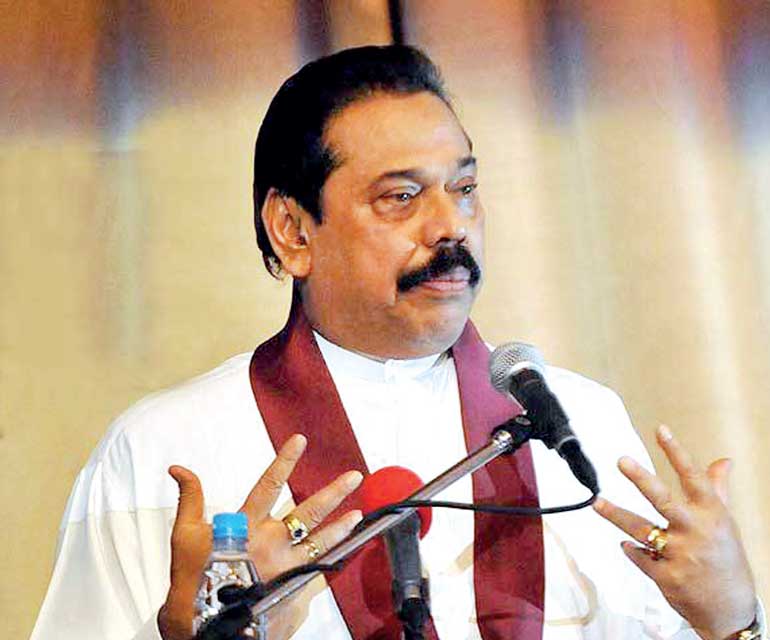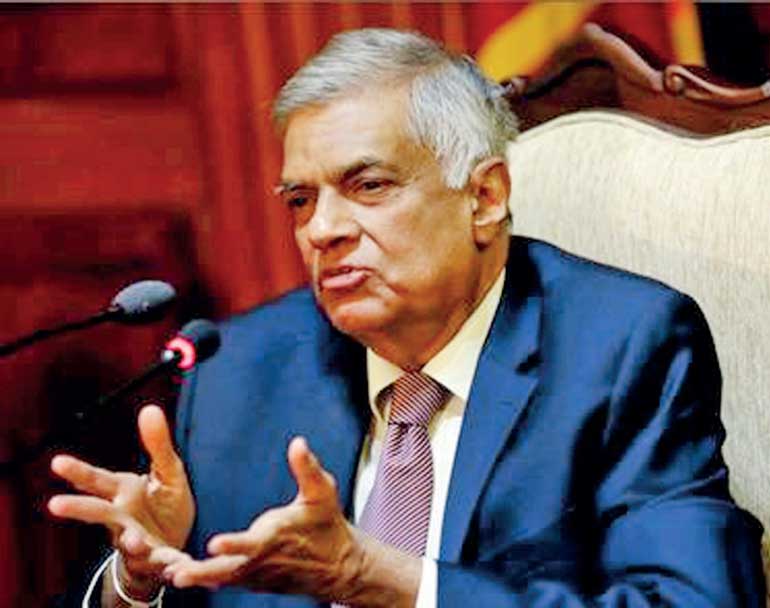Monday Feb 23, 2026
Monday Feb 23, 2026
Monday, 26 March 2018 00:00 - - {{hitsCtrl.values.hits}}
There is an ancient Chinese saying about missing the big picture by focusing on the trivial. This is about the big picture.
The Mahinda Rajapaksa phenomenon is not unique. In human history such men have existed. The French Political Philosopher Étienne de La Boétie spent a lifetime studying tyrants of the type of Mahinda Rajapaksa. Tyrants whose tyranny was with popular consent. He produced the classic- ‘Politics of Obedience: The discourse of voluntary servitude.’

Former President Mahinda Rajapaksa
Listen to G.L. Peiris, Dulles Alahapperuma, Udaya Gammanpila or Dinesh Gunawardena. They are different from bullies and hoodlums such as ‘Raththaran Rohitha’ and ‘Ethanol Arundika’. They are men of more than average learning and acumen. Their category of parasites was described by the French philosopher writing around 1550 thus:
“The despot subdues his subjects, some of them by means of others, and thus is he protected by those from whom, if they were decent men, he would have to guard against himself; just as, in order to split wood, one has to use a wedge of the wood itself.
“Such are his archers, his guards, his halberdiers; not that they do not suffer occasionally at his hands, but this riff-raff, abandoned alike by God and man, can be led to endure evil if permitted to commit it, not against him who exploits them, but against those who like themselves submit, but are helpless.”

Countering the cynical realism of Machiavelli of his time and perhaps Dr. Dayan J of our time, the French philosopher offers us a taste of juridical idealism that is now lost on our failed or nearly failing Yahapalanaya expedition.
Generally, people prefer to be governed reasonably. People do not wish to be governed by the whims of a single man or his brothers or his extended family. But, sometimes the uncertainties of a war can make them seek the leadership of a man who they feel is endowed with such qualities as required to overcome such adversity. The problem then is to get rid of him. Israelites chose Saul. We chose Mahinda Rajapaksa.
The deception, the grand looting of democracy occurs in cases where the people, during wartime emergencies, “select certain persons as dictators, thus providing the occasion for these individuals to fasten their power permanently upon the public.” Once on track, the train hurtles through. The commonwealth is no more. Everything belongs to the master.
Emperor Caligula made his horse Incitatus a Consul. Some thought him mad. He wasn’t mad. He was making a political statement to the senate. He could do what he damned well what he wished. Three years into the Yahapalanaya now turning sour, we forget that we too had someone who ruled as Caligula did. He did better than the Roman emperor. He made cousin Udayanga ambassador to Moscow and cousin Jaliya his envoy to Washington.
In order to understand the big picture, we must not allow ourselves to become mentally clouded and obsessed with one small part of the truth.
We need to see the big picture and not become obsessed with the small section- the no confidence motion against the Prime Minister.
The sum and substance of the big picture is the return of the Rajapaksa family centric kleptocracy either under the premiership of Mahinda or a presidency under Gotabaya.
The purpose of 8 January 2015 change was to restore the rule of law. Have we done that? The ordinary folk are confused. A General was jailed. He was then made a Field Marshal. How do we explain that in terms of the rule law? Did the court-martial that tried him observe natural justice? The Supreme Court held that a court-martial is a part of the land’s justice system. Can the Rajapaksas, if they get hold of the cookie jar, put our first Field Martial back in jail jumpers?
Have we restored the rule of law? There is a thin trace of doubt on the matter. We have made some progress. But in which direction?
Investigations are made. Those investigated are free to move court for injunctions and writs to safeguard their fundamental rights. Alleged offenders are indicted and await trial. Unlike before, the alleged wrong doers are enlarged on bail. Some fall sick and claim that their maladies are treatable only in foreign climes. Nobody is guilty until proven guilty beyond reasonable doubt. This business of reasonable doubt needs some explanation.

Prime Minister Ranil Wickremesinghe
A lawyer once told a jury that the person his client stood accused of having killed was about to walk through the courtroom door. When the jurors looked startled, the lawyer asserted that if those jurors had wondered, even for one second that the victim might appear, that belief constituted enough reasonable doubt for them to find his client innocent. Now that should please our BASL president.
First things first. Mahinda Rajapaksa’s two ambassadors to Washington and Moscow, both cousins are accused of swindling the Government and are presently avoiding arrest. They have taken refuge abroad.

None can accuse Mahinda of ignoring the realities of the bipolar world of foreign relations and his own relations. His most articulate apologist and foreign policy advisor Dr. Dayan Jayatilake would no doubt heap fulsome praise for his even-handed treatment of both Washington and Moscow.
It only serves to endorse the truism of that great sage in journalism H.L. Menken. “Every man sees in his relatives, and especially in his cousins, a series of grotesque caricatures of himself.”
The Man who appointed the two who now refuse to return home for fear of prosecution is yet to tell us why he did it or what the nation gained by his doing it. Don’t blame Mahinda. Nobody has bothered to ask him. By not signing the no confidence motion he is acknowledging a debt he has to repay.
There is indeed honour among thieves, bankers and politicians. They have one thing in common. They deal with what belongs to us and they are all agreed that we are suckers.
Ranil’s plight is different. Everybody wants him to explain about bonds. Added to that, he now stands accused of not doing enough to prevent the boiling over of the tribal cauldron in Kandy.
Here again Mahinda has proved to be the better tactician. He has abandoned moral high ground and now occupies the commanding heights of Sinhala supremacist nationalism.
As a nation state since independence, we have first ignored and later on determinedly resisted a simple inevitable truth. For our nation to take shape, the tribes that constitute the post independent nation must wither or die. What have we done? We have accorded ‘one’ the foremost place and made others retreat in to their respective recesses to survive in existential anxiety.
Whether in opposition or in government, Mahinda Rajapaksa is the man deciding the choreography. On the vote of no confidence he says with ill-concealed confidence ‘wait and see.’
Mahinda is not a rabid racist. He is no tribal savage. If at all, he underestimates the potency of the weapon he wields to gain political leverage over matters momentous and mundane, banal and remarkable.
The recent demise of a Buddhist prelate who pioneered Buddhist evangelism in electronic media demonstrated the potency of piety as an identity marker that separates ‘us’ from the ‘other’.
Mahinda’s weapon – Nationalism – Sinhala Buddhist variety is a private and personal attachment held jealously by every person who subscribes to it. In its collective manifestation it takes on the character of a virulent form of statecraft attached to a specific terrain claimed by those who occupy it.
In the age of digital communication, visual imagery matters more than intent, purpose and even the end result. Mahinda Rajapaksa did not sign the no confidence motion against Prime Minister Ranil Wickremesinghe. But there he was all smiles oozing with confidence, submitting it to the Speaker at the head of JO delegation of Parliamentarians.
Man is not what he thinks he is. He is what he hides. Mahinda hides what he is with consummate skill. When plunder becomes a way of life for a group of men in a society, over the course of time they create for themselves a legal system that authorises it and a moral code that glorifies it.
Can we not love our country and also love justice?